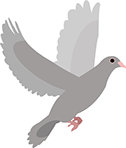
Scroll to Enter



The Mountain Hope Foundation is a non-profit organization working to aid those in need in Afghanistan. Our organization's main goal is to provide aid in a way that is cooperative with the people and communities who we serve. Our projects are determined by availability of local skills, talents and interests in order to promote the self sufficiency that will lead to true and lasting success.


Chai (tea)
Black and green tea are the most popular and common drink in Afghanistan. Sometimes served with cardamom, chai is a staple at every meal, throughout the day and served to guests in homes and businesses.
Like Picnics?
Spending an afternoon at a picnic is a common pastime in Afghanistan. Enjoy some pomegranites and tea!
Khussa (Persian Slippers)
Khussa shoes are a traditional decorative shoe, usually embroidered with gold or silver thread. They are usually only worn with traditional dress at weddings.

Rugs
Afghan rugs, know for their quality, are a popular "souvenir" for foreign visitors



 Lorem ipsum
Lorem ipsum
Sit amet, consectetur adipiscing elit. Aenean consectetur suscipit viverra. Morbi non arcu blandit justo pellentesque condimentum. Integer dignissim risus quis felis accumsan quis pulvinar tellus fermentum.
 Mauris sit amet
Mauris sit amet
Tortor, eget ornare urna. Duis varius tellus eros. Donec odio arcu, rutrum ac rutrum eget, bibendum ac enim. Phasellus hendrerit iacu purus. Aliquam sit amet molestie odio. Sed commodo dictum consequat.
 Ut eget felis
Ut eget felis
Sed velit congue viverra. Sed porta mattis luctus. Curabitur feugiat pharetra sem eu iaculis. Phasellus venenatis volutpat arcu id placerat. Aliquam fringilla ligula eu purus lacinia at volutpat nunc malesuada.



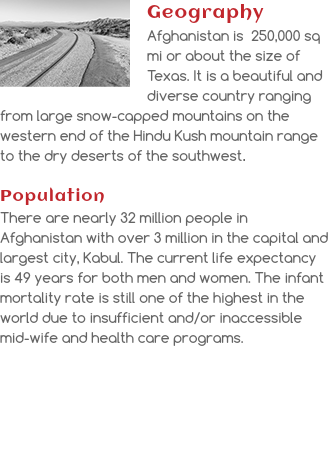

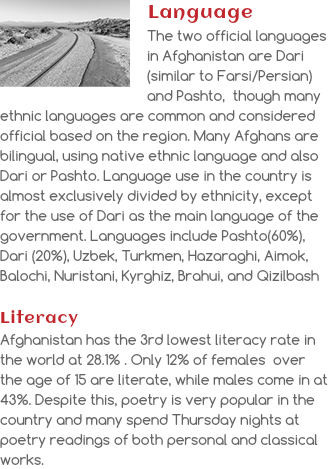

 Government
Government
The area of modern day Afghanistan has been ruled by many Central Asian dynasties, kings,
regimes and warlords throughout it's history, each adding to the political, cultural and religious landscape of the country.
As of 2015, Afghanistan is governed by its' 2nd democratically elected President, Ashraf Ghani Ahmadzai. The country adopted a new constitution in 2004 that is a mixture of Islamic and state legislation, although in many areas local customs and/or Taliban shadow government is the accepted law. Despite constitutional laws, Afghanistan still faces many challenges, in particular in human and womens rights, and in unifying the country under a stable form of government. The ethnic divisions within the country are often seen in the country's politics with most people voting based on ethnic ties and following tribal "code".
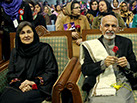
Fun Facts
• Afghanistan celebrates the New Year on
21 March. The largest celebration is the Red
Flower Festival in Mazar-e Sharif
• Schools are closed for three months during
the winter until the new year
• Buzkashi is the national sport; a game similar
to polo played with a goats head
• Team Afghanistan made it to the Cricket
World Championships in 2015
• Many people now celebrate a "national
birthday" on Jan 1. Births are not often
recorded in Afghanistan but with the rise of
the internet and online b-day requirements,
most choose Jan 1 as an easy day to
remember - and a reason for a little
celebration.
• Afghans don't have surnames - they use their
fathers middle and first names -though many
have adopted last names due to
international standards
• Afghanistan currently has 2 UNESCO World
Heritage Sites - The Bamiyan Valley and the
Minaret of Jam
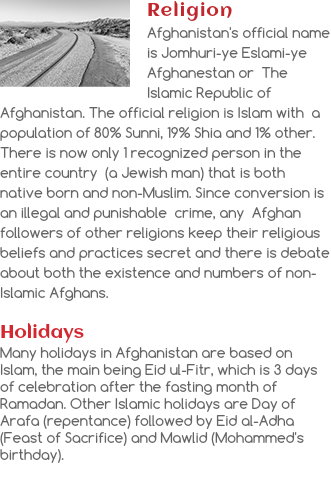

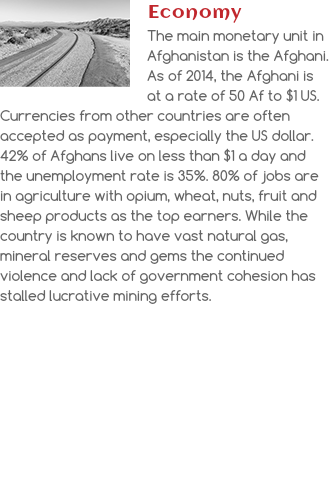

Geography
Language
Government
Fun Facts
Religion
Economy
Kochi Nomads
The Kochi are nomadic and semi-nomadic people who travel throughout Afghanistan and Pakistan living in tents. Their main trade is in livestock and the women are known for their colorful clothing and jewelry.
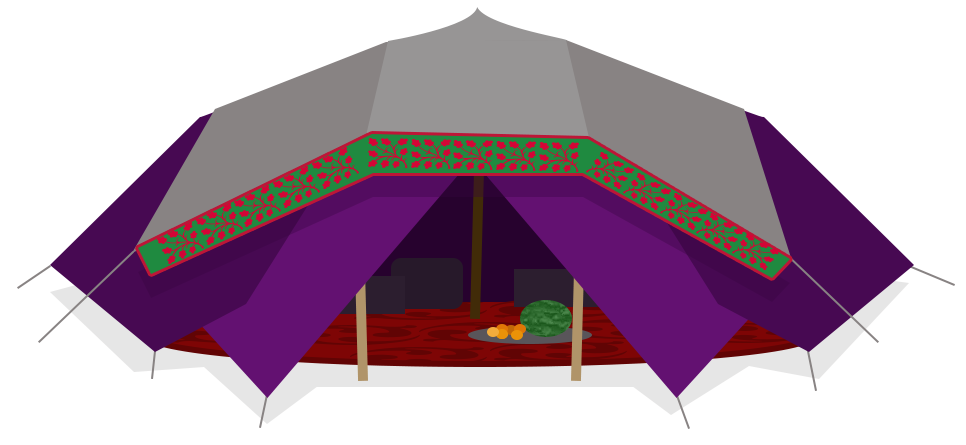



Panjshir Honey & Agriculture Projects
 Panjshir province is located about 3 hours north of Kabul and is known for being the most scenic valley in Afghanistan. Its steep, rugged mountains give way to a valley full of small farming villages and orchards.
Panjshir province is located about 3 hours north of Kabul and is known for being the most scenic valley in Afghanistan. Its steep, rugged mountains give way to a valley full of small farming villages and orchards.
The people of Panjshir have braved many hardships over the past thirty years. Soviet tanks, forts and mines from the war still dot the landscape. During the Taliban, Panjshir was one of the few areas left unconquered, a proof of the extreme fighting and sacrifices made there. Most villagers rely on agriculture either for income or for personal sustenance. Many men are unable to hold full time or labor intensive jobs because of injuries incurred during the wars. Aiding villages with agricultural production allows for some of the neediest to succeed.
The Mountain Hope Foundation has joined with the Ministry of Agriculture in Panjshir to provide bee boxes for families to harvest the honey for extra income. The honey can earn a family an extra $100 dollars a year. The average income is $200 a year in this area. For several families taking part, this will be their only outside income. The honey harvesting project allows for minimal intensive labor and the bee box equipment can be used for years, providing maximum benefits. Other projects include purchasing farm animals for income from dairy and eggs sales.
Bagh (Garden)
Gardens of poplars and fruit trees are found all through the country. Afghanistan is known for it's pomegranites, oranges, apricots and apples and in the Panjshir valley for mulberries.
Mud homes
Many homes are made of sun-baked mud with wooden supports - often three stories tall! Mud and stone houses are common in villages and are often part of a family compound.


Baa, Baa!


Jingle Trucks
Truck painting and decoration is a popular form of artwork with differing regional design. Besides the painting, trucks often have wood or plastic carvings, mirrors, pendants and rows of hanging chains which give them the name "jingle" trucks.
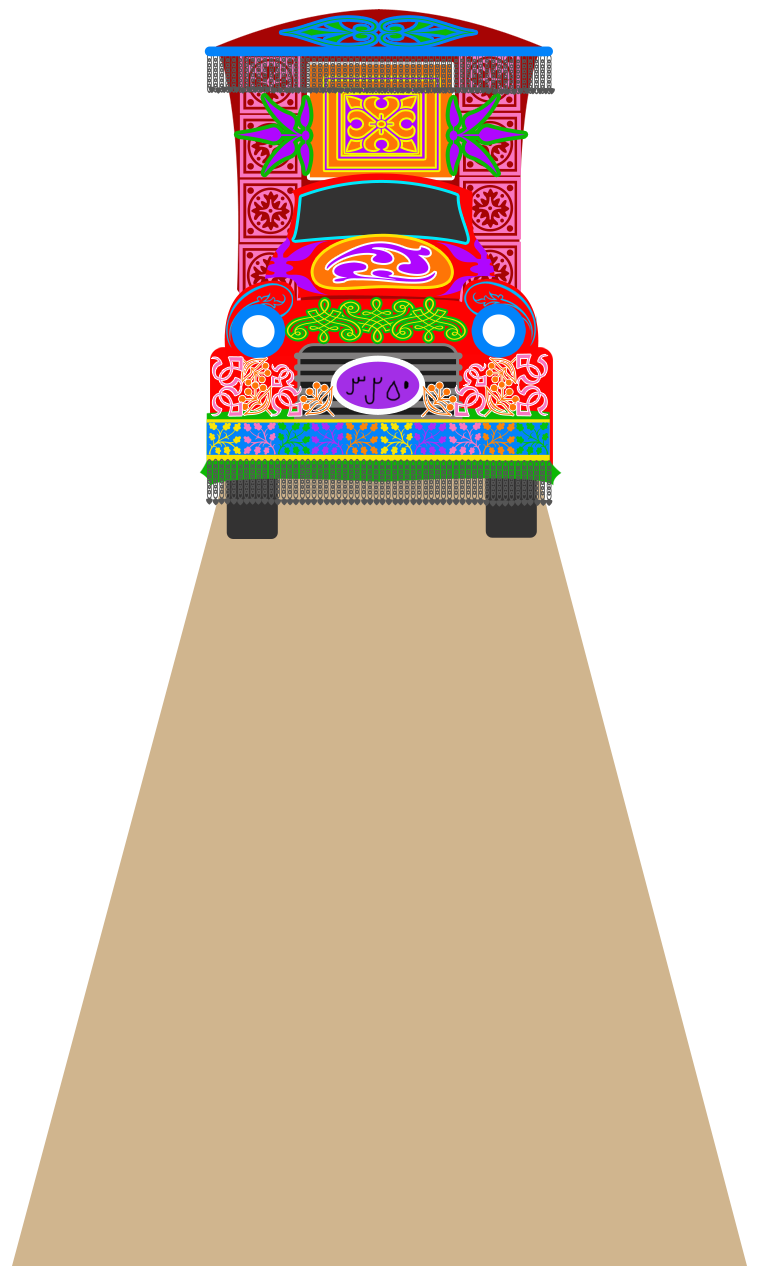

Wardak Village School, Orphanage & Clinic
Wardak is a largely Pashtun province located less than an hour from Kabul. The landscape consists of rugged hills with mud house villages tucked away behind them. Although close to Kabul, it is a rural area without much development. Like much of the country, Wardak is still lacking in education, healthcare and social facilities. In 1997, during the Taliban, construction began in one village on a school for both boys and girls, an orphanage for boys and a clinic, which was the only available in the area for many years. While the school has been successful, and even added a dormitory for girls, the clinic had been without doctors, nurses and supplies for some time. Many people, particularly women in labor, were still coming to the clinic, only to find out, it was no longer open.
The Mountain Hope Foundation has since employed a doctor and two nurses to work at the clinic. Medical supplies and medicines are also being provided and the doors are now open again accepting patients. Maintaining the school, orphanage,girl's dormitory and clinic has been financed by fund raisers in the US and, now, The Mountain Hope Foundation is happy to lend their efforts to continuing success stories in Afghanistan.



Kite Fighting
A popular pastime, kite fighting is played by young and old. The object; to cut through other kite strings until there is only one kite left in the sky. The kite strings are covered in fine powdered glass making them sharp enough to cut down an opponents kite - and to cut fingers!

Email Us!

For more information about The Mountain Hope Foundation and to learn how you can help, send us an email

themountainhope@yahoo.com
In the city...
Modern homes in Afghanistan, particularly in cities, are colorful, large, multi-story and often highly decorated with the flat rooftops serving as large balconies - a great place for kite fighting! 3-5 story homes are common with large extended families living together.















